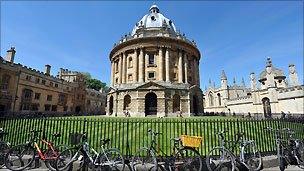Oxford dons declare 'no confidence' in Willetts
- Published

One academic said the reforms could take Oxford back to the days of Brideshead
Oxford University academics have delivered a crushing vote of no confidence in Universities Minister David Willetts.
The university's governing body backed a motion condemning the government's higher education policy by 283 votes to five.
History professor Robert Gildea said the changes to university funding were "reckless, incoherent and incompetent".
The government insisted its reforms were fair and affordable.
In Oxford's Sheldonian Theatre, the university's governing body - the congregation - supported a no confidence motion in the universities minister and the government's handling of higher education in England.
'Red carpet for the rich'
In a packed auditorium, this so-called parliament of dons delivered a powerful symbolic blow to the government's university reforms.
As the result of the vote was delivered, there were cheers from inside and from student protesters outside.
The university's council will now write to the universities minister to pass on this official condemnation.
Academic staff, including the university's vice chancellor, heard a series of speech attacking the marketisation of universities, budget cuts and raising fees to £9,000 per year.
Professor Gildea warned the changes would turn the university system into a "red carpet for the rich" which would take Oxford "back to Brideshead".
The warden of St Antony's College, Margaret MacMillan, warned that the budget cuts would force universities to fill more places with overseas students.
"We don't want to end up as a finishing school for rich students from around the world," said Professor MacMillan.
'Long game'
And she attacked a higher education policy being "made up on the fly", which made it difficult for universities to plan.
Cutting university teaching budgets sent an international message that universities were an "investment not worth protecting", she told the gathering of academics.
Paul Coones of Hertford College linked the campaign against higher education changes with protests against NHS reforms and calls to save public libraries.
He warned that the "long game" taking place was a push to move universities into the private sector.
There were also warnings that the increase in student debt accompanying higher fees would make it particularly difficult for young people to continue into postgraduate research.
Laura Kirkley, lecturer in French at Queen's College, said this would starve higher education in the future of the most talented students.
Alexandra da Costa, an English fellow from St Hilda's College, said university degrees would be taught "by the wealthy for the wealthy".
Students had gathered for a protest outside the meeting and the president of the university's student union, David Barclay, argued that the move to market forces would "push some subjects to the brink of extinction".
And he challenged whether the future shape of higher education should be determined by the consumer choices of 17-year-old applicants.
Market in education
He drew loud applause by calling on the meeting to consider those future students who might no longer apply to Oxford when fees were increased.
History professor Howard Hotson said there was no evidence that raising fees and introducing a market would save money, improve standards or widen choice.
Academics at Cambridge University are set to debate a similar motion of no confidence and there are calls for similar debates and petitions in other universities.
And at Warwick University about 700 academics and students have signed a petition voicing no confidence in the universities minister.
A spokesman for the Department for Business, Innovation and Skills said universities had always been bastions of free speech and debate.
"However, our student and university finance reforms are fairer than the present system and affordable for the nation.
"No student will be asked to pay upfront costs, there will be more financial support for poorer students and those who go on to earn the highest incomes will make the largest contributions after they have graduated.
"Our reforms put students in the driving seat while putting universities on a sustainable footing for the future."
Shadow Universities Minister Gareth Thomas said: "This is a devastating and unprecedented vote, with Oxford academics confirming what a series of independent experts and the Public Accounts Committee have already made clear; that 80% cuts, trebling tuition fees and cuts to research facilities are unfair, unnecessary and unsustainable."